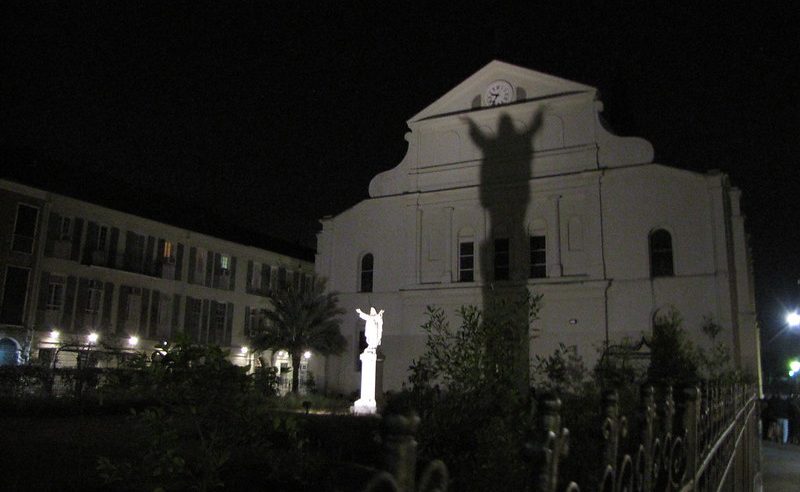Terrorism and Evil
20 January 2025
On 1 January of this year, an American man drove his pickup truck into a crowd on Bourbon Street in New Orleans (Louisiana, US). Fifteen people were killed and dozens of others injured. The perpetrator, Shamsud-Din Jabbar, a resident of Houston (Texas), was inspired by the Islamic State’s violent extremist ideology. In response to this cruel attack and the suffering it brought about, New Orleans Police Superintendent Anne Kirkpatrick said: “This is not just an act of terrorism. This is evil.” New Orleans city council member Oliver Thomas went even further and commented: “Remember there is no making sense of evil.”
Use of the phrase ‘evil’ is in fact quite common when it comes to terrorism. More precisely in a threefold way. First, terrorists themselves regularly use the term ‘evil’ to describe what they are fighting and to justify their violent deeds. The Norwegian right-wing terrorist Anders Breivik, for instance, in his manifesto 1983: A European Declaration of Independence (2011), uses the term dozens of time to characterize such phenomena as Islam, liberalism, and the European Union. Second, practitioners, policy makers, and politicians frequently employ the notion of evil to describe what they are combating. George Bush for instance, famously spoke of “an axis of evil, arming to threaten the peace of the world.” Third, even academics studying terorrism regularly use the term ‘evil’ to qualify terrorism, witness such book titles as Confronting Evils: Terrorism, Torture, Genocide (by Claudia Card) and Overcoming Evil: Genocide, Violent Conflict and Terrorism (by Ervin Staub). But what exactly is it to say that terrorism or a specific act of terrorism is evil and does it follow that we cannot make sense of such acts?
I think most of us would agree that using a pickup truck to run over innocent people is evil. Perhaps not as evil as anything could possibly be; maybe torturing people because one ejoys it or burning people alive, as the Islamic State did, is even more evil. Still, it is evil. However, saying that a terrorist attack like that which occurred in New Orleans is evil, questions some of our philosophical and theological theories about evil.
According to Neo-Platonism, for instance, evil is not so much the actual presence of something bad, but the absence or non-existence of something that is good (often captured by the Latin phrase privatio boni). Evil, thus, is the privation of substance, form, and goodness. Illness, for instance, is just the absence of health and sin the absence of virtue. Well-known Neo-Platonists who proposed theories along these lines were Plotinus, Clement of Alexandra, and perhaps most famous of all, Augustine of Hippo, who famously said: “For what is that which we call evil but the absence of good?” (in his Enchiridion, chapter XI) One clear problem here is that in calling acts of terrorism evil, such as the New Orleans attack, we do not merely want to say that they display the absence of goodness or virtue. Rather, they our point seems to be that they actively display something bad, cruel, horrendous. We witness the presence and substance of something we abhor, and we feel we truly need the notion of evil to describe what is going on in such situations.
Another philosophical theory of evil that descriptions of terrorism in terms of evil question, is that of Immanuel Kant. According to Kant, our will is morally good if we perform a right action precisely because it is right. In his Religion within the Limits of Reason Alone, Kant explains that this means that evil kan take three forms: (i) one sets out to do the morally right thing because one knows it is morally right, but one does not carry through with it (a mild version of evil), or (ii) one seeks to do the morally right thing but at least partially for reasons that have nothing to do with its moral rightness (e.g. making money), or (iii) one does not do the morally right thing because one prioritizes one’s self over the moral law (Kant calls this ‘radical evil’). There is also the metaphysical possibility of doing evil for evil’s sake, but that, according to Kant, is impossible for humans—only the devil can do that. Thus, whereas Neo-Platonism provides primarily a theory of the nature of evil, this view of Kant is perhaps better understood as a theory of motivations for evil. One may wonder whether this theory matches what we see in terrorist attacks such as that in New Orleans. The attack was in all regards morally wrong, so (i) is not an option. The attack was carried out on the basis of moral considerations, such as the alleged sexual perversity of Americans, so (ii) is not an option either. And it seems Shamsud-Din Jabbar did not prioritize himself over his moral reasons—in fact, he was willing to sacrifice his life for his moral cause. And, yet, what he did seems deeply evil. Perhaps, then, Kant’s theory of the motivations for evil acts is incomplete. And it raises further questions about Shamsud-Din Jabbar’s moral state of mind: Did he do evil for the sake of evil? Did he do evil while falsely (presumably culpably) believing that what he did was right and even morally mandatory? Could he perhaps have had both of these motivations simulatenously? These are important philosophical questions about such terrorist acts.
Things also hold the other way around: our philosophical and theological theories of evil can question the statements concerning evil that we make about an evil like the terrorist attack in New Orleans. Remember that city council member Oliver Thomas commented that we cannot make sense of evil. What exactly does that mean and why should we think that we cannot make any sense of evil?
There are indeed influential philosophical and theological theories of evil that characterize evil partly in terms of its alleged incomprehensibility. These are sometimes called specific varieties of ‘bystander accounts’. The idea is that what renders some act evil is not a feature of that act itself but a feature of those who witness the act, such as that they respond with feelings of horor and disgust or that they cannot comprehend the act in any way. Charlotte Delbo, for instance, speaks of attempts to explain evil as “explaining the inexplicable”. Susan Neiman in her book Evil in Modern Thought also develops an account in terms of incomprehensibility. And Paul Ricoeur’s theory of evil as absurd might also fall under this heading.
Oliver Thomas, then, voiced an idea that can also be found in philosophical theorizing. But what exactly does the unintelligibility or incomprehensibility that they refer to amount to? It does not mean that we cannot at least partially explain why Shamsud-Din Jabbar committed this terrorist attack. After all, the literature is rife with valuable attempts to explain terrorism. In Jabbar’s case, that could amount to an explanation in terms of, say, his three failed marriages, his financial problems, his rejection of Western values (his denouncement of Western music and the use of alcohol and marijuana), inspiration from ISIS ideology, and so on. Perhaps what it means is rather that we cannot make sense of his actions from a first-person point of view. Perhaps we can explain his behavior (Erklären), but we cannot understand it (Verstehen). Even that is a too quick, though. It is getting more common in the field of terrorism studies to do qualitiative field work and ask (former) terrorists why they performed the actions that they did. This has resulted in such things Scott Atran’s theory in terms of sacred values and Beatrice de Graaf’s Radical Redemption Model for Jihadis’ radicalization. By carefully listening to terrorists, we have come to understand more about their deeper reasons and motivations in performing their deeds. Perhaps, then, what is meant is not so much that we cannot acquire first-person understanding, but that we cannot acquire emphathetic understanding: even if we somehow imagine ourselves in their circumstances, we could not possibly imagine ourselves performing these actions. If that is indeed the case, that raises further questions: Does this hold for all terrorists?, Does this hold for all of us or only some of us, and If we cannot do so, exactly why is that?
Exactly how terrorism relates to evil, then, is a rich and important research topic that deserves much more rigorous empirical and philosophical work.
Photo: New Orleans French Quarter by Joanne C. Sullivan on Flickr
Prof. dr. Rik Peels holds a University Research Chair in Analytic and Interdisciplinary Philosophy of Religion at the Vrije Universiteit Amsterdam and leads the ERC-funded Extreme Beliefs project. Email: h.d.peels@vu.nl
- October 2025
- September 2025
- August 2025
- July 2025
- June 2025
- May 2025
- April 2025
- March 2025
- February 2025
- January 2025
- December 2024
- November 2024
- October 2024
- September 2024
- August 2024
- July 2024
- June 2024
- May 2024
- April 2024
- March 2024
- February 2024
- January 2024
- December 2023
- November 2023
- October 2023
- September 2023
- August 2023
- July 2023
- June 2023
- May 2023
- April 2023
- March 2023
- February 2023
- January 2023
- December 2022
- November 2022
- October 2022
- September 2022
- August 2022
- July 2022
- June 2022
- May 2022
- April 2022
- March 2022
- February 2022
- January 2022
- December 2021
- November 2021
- October 2021
- September 2021
- August 2021
- July 2021
- June 2021
- May 2021
- April 2021
- March 2021
- February 2021
- January 2021
- December 2020
- November 2020
- October 2020
- September 2020
- August 2020
- July 2020
- June 2020
- May 2020
- April 2020
- March 2020
- February 2020
- January 2020
- December 2019
- November 2019
- October 2019
- September 2019
- August 2019
- July 2019
- June 2019
- May 2019
- April 2019
- March 2019
- February 2019
- January 2019
- December 2018
- November 2018
- October 2018
- September 2018
- August 2018
- July 2018
- June 2018
- May 2018
- April 2018
- March 2018
- February 2018
- January 2018
- December 2017
- November 2017
- October 2017
- September 2017
- August 2017
- July 2017
- June 2017
- May 2017

